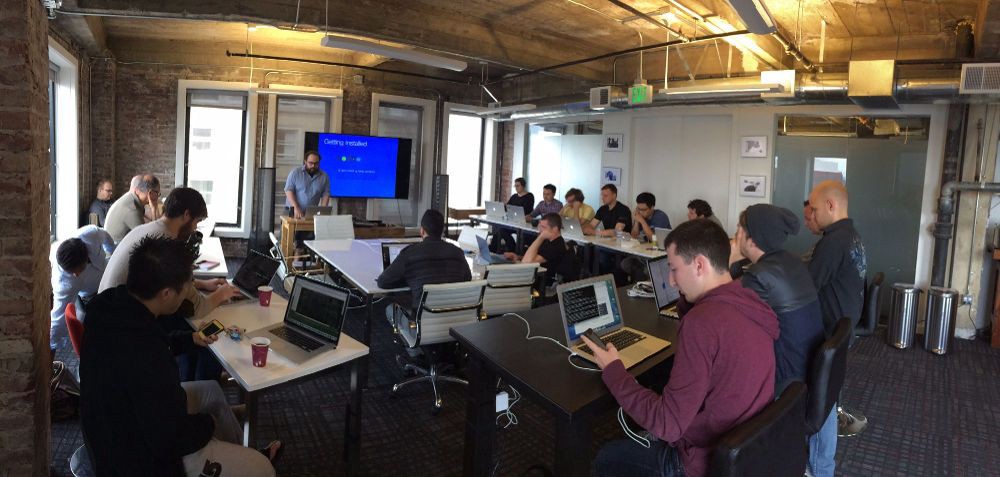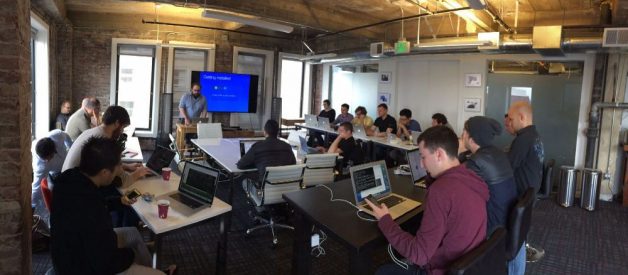
As many of you know by now, I graduated from Hack Reactor September 2017 amidst a lot of anxiety regarding whether I should join a coding bootcamp in a ?saturated engineering market?. Not only do new coding bootcamps pop up every few months but there?s a lot of confusion regarding their efficacy for those seeking a career switch. Most recently, Hack Reactor was acquired by Galvanize ? so it?s obviously doing pretty well. Having begun my job search in the Bay Area however, every job seemed like an engineering job; engineers were a dime a dozen and yet all I ever heard was ?you?re a woman engineer, you?ll get a job in no time!?.
Hence, my number one anxiety post-graduation was: how do I stand out against a sea of software engineers with accredited grad/post-grad degrees?
Well, let?s rewind?why a Coding Bootcamp?
I?ve gone into details of why I decided to go to a coding bootcamp in previous posts, but the over-arching reasons were just three. I had attempted to apply for a Master?s, a BA degree took too long and most bootcamps boasted great placement rates:
- so I wanted to ?hack? my way into a career path that would allow me global mobility (as an Indian diplomat who?d moved every 3 years growing up, the access to a global job platform is extremely exciting),
- the chance to pursue my interest in design and engineering (?making something out of nothing? ? being my mantra) and,
- most importantly, a career path that was in-demand, paid well and allowed for exciting opportunities in innovation.
See, coming for a background in architecture/civil engineering, I was extremely tempted by any opportunity that joined my interests in learning how things work (i.e. the web primarily), and designing something from the ground up. Engineering ? and not just web development ? combines both of these interests of mine. Currently, I find myself delving deeper into questions of software architecture and design, while also being fascinated by how our users use our internal tools (UX/UI).
Why I Chose Hack Reactor Remote over On-Site
- Money was the greatest factor in my decision here ? it goes without saying that any on-site curriculum would require a large amount of money for commute/food/rent on top of the price of the curriculum
- I had done a ?bootcamp?-style program at Harvard 3 summers ago and knew I was often distracted by my peers ? due to my outgoing nature, I?d often want to take part in the social activities rather than enforce a strict regimen
- Comfort of being at home and coding into the night ? without having to worry about commute
The Overall Hack Reactor Remote experience
The first time I applied to Hack Reactor in March 2017, I didn?t get in. I ended up enrolling in Hack Reactor?s Premium Prep program in April 2017, went through the interview process again which included 3 small toy-problems and a behavioral interview, and I made it through. While it has been a while since I went through the experience, I highly recommend it. Even though the basic prep is free, what I enjoyed about the Premium experience was getting the real-life taste of Hack Reactor ? this meant I could understand the actual intensity of the workload, the calibre of the professors and so on. It left me motivated and didn?t really burn a hole in my pocket (or well, relative to the actual program it didn?t, haha).
So without further ado, here?s my low-down on the Hack Reactor experience. I joined HRR on June 2017 (so take that with a grain of salt as they keep iterating).
The Good:
- Community ? This is hands down my favorite thing about the Hack Reactor Remote experience. While you may think that being remote wouldn?t lead to any serious friendships and internet relationships aren?t sustainable, I was extremely and happily surprised to the contrary. Being on Skype with my peers for 12 hours a day, 6 days a week for 3 months ended up with many late-night pair-programming sessions and a ton of bonding time. Since the program is also international (as it?s remote), if I was staying up late and wanted help solving a problem, there was a high probability that a classmate from England or Bangladesh was up too. To me this was almost more powerful than being on-site because there was always someone available at any time of day to discuss code. There was also a lower probability of distraction, instead of being seduced by my HR peers to go out on Saturday night, I would find myself coding/revising on the weekends. There?s a certain degree of hindsight bias to this comment, maybe it was my cohort or my determination during HRR but I found remote helped me be more focused.
- The Grind ? Hack Reactor was fast-paced, you learn how to learn quickly and don?t have time to be scared. Scary concepts at first (like AJAX requests which were reaaaally hard for me to understand prior to HR) are made simple. At the end of the day, it helps to have someone explain *that complicated topic* in 20 minutes instead of digging around for a day trying to make sense of it. To me, that is the true value of a coding bootcamp. You don?t become an engineer here, in fact you probably won?t become a wizard web-dev either (both come with experience and filling the large gaps in knowledge that bootcamps leave you with) but you do learn the basics of the web and unravel enough to get up and running.
- The Team Projects ? A coding bootcamp is essentially a very-long hackathon. Or at least Hack Reactor is. And so with this comes the excitement of thinking up new ideas, and building them from scratch. Even though this doesn?t give you a taste of working on a large, industrial-sized project it does teach you the very valuable skills of asking for questions, thinking of features, working with a ?PM? (a person you assign on your team) and learning to work with Git. Essentially, you get an appetite of how powerful this new skill you are learning is. I think this is what separates a ?coding bootcamp grad? from a self-taught learner who don?t get the opportunity to work in teams (unless of course they choose to). But no matter what, this experience couldn?t have been replaced with udemy tutorials or even doing projects myself.
The Not-So-Decent:
- Lack of Live Lectures: Hack Reactor Remote didn?t keep up with Hack Reactor SF so we didn?t get live lectures, and sometimes they were a year or two old. Because of the work that goes into making Hack Reactor ?remote-friendly? our program was a year or so behind the SF curriculum (which is consistently updated to meet the market needs). This doesn?t put you at a severe disadvantage, but is something to be considered when choosing which curriculum to take on.
- Lack of quality mentorship: Much like many coding bootcamps model, a lot of our mentors didn?t have real-world experience but rather recent grads themselves looking to re-apply themselves in the curriculum. This often led to the feeling of the ?blind helping the blind? and spreading not the best debugging or design practices. That being said, we were treated to talks by engineers consistently and on a weekly basis.
The Bad:
- The Cost, hands down. With a ticket value of almost $20k, it?s clear that only a select few can afford this program. Because of this price tag however, many take loans and many are dissuaded from taking on this program. In the more recent years, with cheaper coding bootcamps, it?s probably become harder for HR to market for itself which has led to a degradation of the quality of people that attend the bootcamp. What was once an ?Ivy-league?-only bootcamp, has become significantly easier to get into. Does that mean there aren?t still intelligent and capable people joining your cohort? No. But have things changed in the last 5 years and the fierce competition to get in? Yes.
- You only learn Javascript. I can?t argue the inverse of this having not learned a second programming language until my first engineering job, but only knowing Javascript has it?s pros and cons. You know the ins-and-outs of JavaScript well, but OOP language like Python and PHP are completely unfamiliar territory. I haven?t found that this affected my job search much (as my interviews were all algorithm focused, or making a full-stack app which can be done with JS) BUT it did make the first few months at my current job much harder. Coding bootcamps like Coding Dojo work to solve this issue, so take with that what you will.
Overall experience: 11/10.
Despite the ups-and-downs, Hack Reactor delivered. It worked to boost me in the direction I wanted after a deliriously depressing year in my life where I?d lost a direction. A year later, I?ve found myself as a full-stack engineer at a FinTech in Mexico City and I?m extremely grateful for the hustle that Hack Reactor catapulted me towards.
Would I do anything differently?
aka do I have any buyer?s regret/remorse? Hind-sight is 20/20, and I?m happy to say I truly don?t, except that I wish I?d embarked on this journey sooner and explored the different aspects of it further. To me, after trying to self-learn (and feeling incredibly unmotivated for most it), a coding bootcamp was the slap-in-the-face I needed. The pace, environment and structure was really helpful for me.
But I wish someone told me earlier, that a coding bootcamp only prepares you for the first couple of months of your job. You don?t become a software engineer at a bootcamp, but a web-developer. Which means you?ll spend the next few years playing catch-up, working hard to become an engineer.
How can you prevent this? By studying core concepts, prior to joining a coding bootcamp
I googled ?What should I study before joining Hack Reactor?, a bunch prior to joining HRR and I would genuinely say, aside from the basics of JS (which you need to know to join), learning more JS is unnecessary as HRR handles that aspect extremely well. From understanding client-server relations, to how a DB works, you?ll be covered. However, you do miss out on knowing core engineering concepts, which include knowledge about networking, containerization, Operating System, how to grok bash.
Here are some of my favorite resources to help you on that front:
- Computer Science Distilled : A great book that uncovers in simple english basic Computer architecture and hardware knowledge
- ALL OF JULIA EVANS ZINE?S: She does such a fantastic job at making complex ideas simple, like Networking and Bash.
- Algorithms to Live-by: Just a fun read, that looks at how computer science concepts like Caching apply in real life.
Fun podcasts:
- CodeNewbie: Makes complex topics simple by interviewing experts
- ThePythonPodcast, but especially this episode with Gary Bernhardt which goes into the pros/cons of coding bootcamps. This guy is a legend.
So where am I now?
Joining a coding bootcamp only got me so far. After leaving as a mentor at HolaCode, I decided I wanted real-world experience. Since then, I?ve been working as a full-stack engineer at Credijusto, a fintech in Mexico City that provides loans to small-to-medium sized businesses at significantly lower interest rates than banks and traditional financing institutions. It?s been a difficult learning curve here, but I?m working hard. Look out for another post on a day in the life of an engineer on upcoming blogs!


